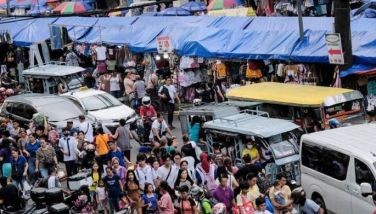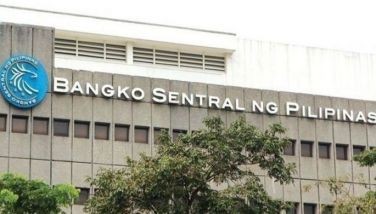First 100 days of PBBM: Solid gains & serious challenges
President Ferdinand “Bongbong” Romualdez Marcos Jr. marks his first 100 days in power today, Oct. 8. His new government has achieved considerable solid gains and steadily consolidated what he described as “a functioning government,” while also still encountering challenges and perceived shortcomings.
1. Assembling a competent, technocratic economic team. President Bongbong Marcos has reassured the business community with his appointments of top economic managers, who are veteran technocrats with excellent track records led by Finance Secretary Dr. Ben Diokno. Respectable socio-economic targets, policies, and reforms are being implemented to boost Philippine economic recovery and growth despite global uncertainties and inflation.
Among those who have expressed high confidence in the Marcos economic and socio-economic reform agenda include former president and now Congress Senior Deputy Speaker Gloria Macapagal Arroyo, and Federation of Filipino Chinese Chambers of Commerce and Industry Inc. (FFCCCII) president Dr. Henry Lim Bon Liong.
In fact, in the Oct. 5, Pandesal Forum, Dr. Lim replied to a media question to rate the Marcos administration’s first 100 days on a scale of one to 10. He gave a high rating of between 8.5 and 9. Dr. Lim also reaffirmed FFCCCII’s bullish forecast of 2022 Philippine economic growth at 6.5% to 7.5% due these reasons: the continuous post-pandemic reopening of the economy and continuity of socio-economic reforms.
One challenge to the Marcos administration is if could muster the political will to urge its allies in the Philippine Senate to ratify the Regional Comprehensive Economic Partnership (RCEP) agreement. Various foreign investor business groups in the country such as the Joint Foreign Chambers (JFC) like the American, Australian-New Zealand, Canadian, European, Japanese, Korean chambers of commerce, and the Philippine Association of Multinational Companies (PAMURI), urged the Senate to concur the ratification of the Regional Comprehensive Economic Partnership (RCEP) agreement, because the RCEP shall make the Philippines more globally competitive and truly attractive to foreign investors.
Julian Payne, president of the Canadian Chamber of Commerce of the Philippines, warned that failure to ratify the RCEP would result in lost opportunities for export industries that have been impacted by the pandemic.
2. Prioritizing agriculture and food security. President Marcos’ dramatic and unique assumption personally of the position as Agriculture Secretary manifested his wanting to give to priority to agriculture, food self-sufficiency, and the welfare of farmers and fishermen. This bold political move has bolstered high hopes in the agriculture sector, encouraged the private sector and other stakeholders to redouble efforts.
Critics have pointed out that among the shortcomings in agriculture is the alleged lack of specifics, sense of urgency and sweeping reform initiatives to modernize the agriculture, fisheries, and aquaculture sectors. They raised the questions of high prices of rice and other food commodities, and the continuing import dependence as unresolved challenges.
3. Highlighting centrality of ASEAN in Philippine diplomacy. The first foreign trips of President Marcos to Singapore and Indonesia have wisely given strategic importance to the 10-nation ASEAN region in Philippine diplomacy. These trips also helped showcase the confidence of President Marcos in the international arena. Did these successful trips also underscore Philippine neutrality and not wanting to choose between geopolitics rivals USA and China?
ASEAN is also one of the world’s fastest-growing economic regions, with a huge consumer market and vast resources. A challenge to President Marcos and the Philippines is the rise of several countries in ASEAN as direct competitors of the country in wooing foreign investors, tourists and trade, like Vietnam.
4. Promoting Philippines as investment hub to Singapore and Wall Street. In two visits to Singapore and to the New York Stock Exchange in Wall Street (on the sidelines of his trip to the United Nations), President Marcos has tried to burnish the international image of the Philippines as an ideal place for investments and doing business. He and his economic managers — accompanied by top Philippine business leaders — introduced and explained to foreign investors the steady opening of the Philippine economy, the numerous economic opportunities, and the recent liberalization of rules for foreign direct investments (FDIs) in key industries.
Although the trips of President Marcos to Singapore and Wall Street are earnest efforts to sell the Philippines as ideal investment destination, some top businessmen said the claim by some government officials that the trips “brought home business commitments amounting to $18.92 billion (over P1 trillion pesos) estimated to generate around 134,285 jobs” is described as “exaggerated hyperbole” and that government needs to follow through on these commitments.
5. Upholding peace and order, rule of law. President Marcos and Philippine National Police (PNP) chief General Rodolfo Azurin, Jr. had publicly reiterated a change in the government’s anti-crime efforts, by focusing more on crime prevention and apprehension rather than the past government’s all-out draconian, violent war on illegal drugs. The Marcos government remains committed to fighting illegal drugs and crimes, but without the past controversial strategies, which resulted in reported thousands of killings in the streets. This reform by President Marcos has improved the international reputation of the Philippines.
Another peace and order, and also a foreign policy challenge to the Philippines is how the Marcos government shall deal with the controversial Philippine online gaming operations (POGOs). These POGOs not only have bred so many high-profile crimes and social problems in the country, but also worsened graft and corruption in the country. China leaders and diplomats have officially requested the previous Duterte government to ban the POGOs because these are illegal. Will the Marcos government and its allies among legislators be able to ban this controversial industry?
6. Upholding independent foreign policy of friendship with all world powers. President Marcos has continued upholding the Philippines’ constitutionally-mandated independent foreign policy by making the country a true friend of all the world’s big powers and an enemy or threat to none.
President Marcos has repaired the country’s recently frayed relations with the US in various meetings with top American leaders, including President Joe Biden, in the sidelines of the UN. On the other hand, Marcos had also reaffirmed the country’s ancient friendship and traditional trade ties with China in his meetings with Vice President Wang Qishan and Ambassador Huang Xilian, as well as in his speech at the Association for Philippines China Understanding (APCU).
Amid the tense USA-China geopolitics rivalry, can President Marcos astutely navigate a truly independent foreign policy, which shall be guided solely by Philippine sovereignty and national interests, not becoming perceived to be a pawn of any one superpower? President Marcos and others have raised the need to review the Mutual Defense Treaty (MDT) between the Philippines and the U., plus other treaties allowing American military facilities in the country. Can these be used in case of armed conflict between USA and China over Taiwan or other emergencies, which are outside the concerns or interests of the Philippines? Are these military agreements beneficial to the country? Is the US really treaty-bound to defend the country and has the US Senate ratified these agreements?
Also on foreign policy, can President Marcos and his advisers tap diplomatic goodwill and succeed in negotiating a win-win agreement with China for the proposed joint exploration and development of natural resources in the West Philippine Sea?
Another sign of President Marcos’ attempts to solidify the Philippines’ independent foreign policy is his telling media in New York that the government is negotiating with Russia to purchase certain commodities for the economic benefit of the country, despite the on-going USA-led trade sanctions on Russia due to the war in Ukraine.
If the Philippines can, indeed, emulate our Asian neighbors South Korea, India, China and Japan in not heeding the American trade sanctions, but proceed with trade exchanges with oil and natural gas-rich Russia for the national economic interests of the Philippines, then that’s a true test of the new government’s wisdom and geopolitics neutrality.
Several business tycoons said PBBM’s first 100 days give them optimism that the Philippines shall be able to strengthen equidistant and good relations with all the world’s big powers — USA, China and Russia — but not becoming entangled in their geopolitics rivalries, and that diplomacy shall be guided solely by Philippine national interests.
***
Thanks your feedback! E-mail [email protected] or follow WilsonLeeFlores on Instagram, Twitter, Facebook and subscribe to my YouTube Wilson Lee Flores TV.
- Latest
- Trending





























